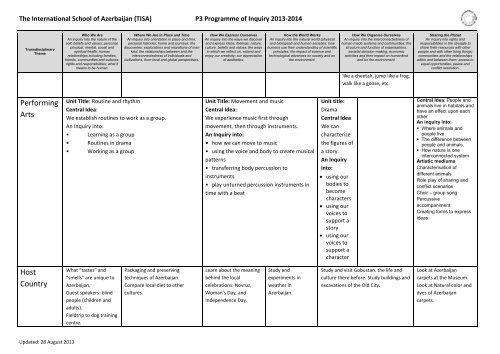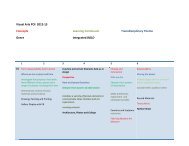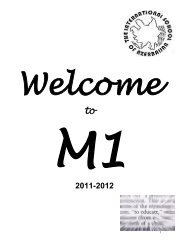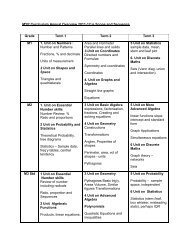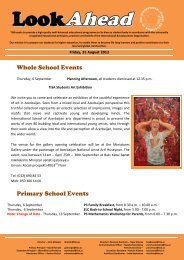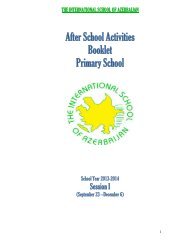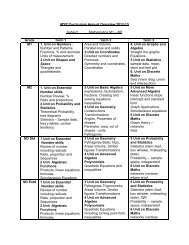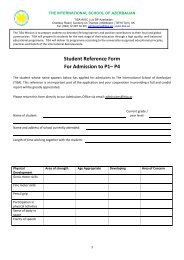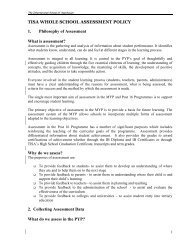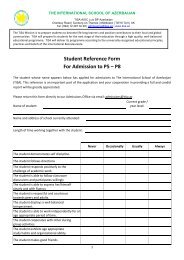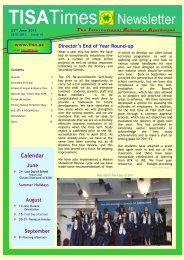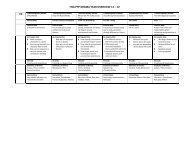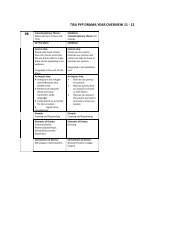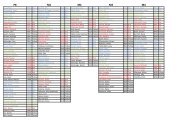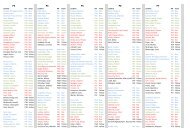The International School of Azerbaijan (TISA) P3 Programme of Inquiry 2013-2014
P3 Year Overview 2013-14 - The International School of Azerbaijan
P3 Year Overview 2013-14 - The International School of Azerbaijan
Create successful ePaper yourself
Turn your PDF publications into a flip-book with our unique Google optimized e-Paper software.
<strong>The</strong> <strong>International</strong> <strong>School</strong> <strong>of</strong> <strong>Azerbaijan</strong> (<strong>TISA</strong>) <strong>P3</strong> <strong>Programme</strong> <strong>of</strong> <strong>Inquiry</strong> <strong>2013</strong>-<strong>2014</strong><br />
Transdisciplinary<br />
<strong>The</strong>me<br />
Who We Are<br />
An inquiry into the nature <strong>of</strong> the<br />
self; beliefs and values; personal,<br />
physical, mental, social and<br />
spiritual health; human<br />
relationships including families,<br />
friends, communities and cultures;<br />
rights and responsibilities; what it<br />
means to be human.<br />
Where We Are in Place and Time<br />
An inquiry into orientation in place and time;<br />
personal histories; home and journeys; the<br />
discoveries; explorations and migrations <strong>of</strong> man<br />
kind; the relationships between and the<br />
interconnectedness <strong>of</strong> individuals and<br />
civilizations, from local and global perspectives.<br />
How We Express Ourselves<br />
An inquiry into the ways we discover<br />
and express ideas, feelings, nature,<br />
culture, beliefs and values; the ways<br />
in which we reflect on, extend and<br />
enjoy our creativity; our appreciation<br />
<strong>of</strong> aesthetics.<br />
How the World Works<br />
An inquiry into the natural world (physical<br />
and biological) and human societies; how<br />
humans use their understanding <strong>of</strong> scientific<br />
principles; the impact <strong>of</strong> science and<br />
technological advances on society and on<br />
the environment.<br />
How We Organise Ourselves<br />
An inquiry into the interconnectedness <strong>of</strong><br />
human-made systems and communities; the<br />
structure and function <strong>of</strong> organisations;<br />
societal decision-making; economic<br />
activities and their impact on humankind<br />
and on the environment.<br />
Sharing the Planet<br />
An inquiry into rights and<br />
responsibilities in the struggle to<br />
share finite resources with other<br />
people and with other living things;<br />
communities and the relationships<br />
within and between them; access to<br />
equal opportunities; peace and<br />
conflict resolution.<br />
like a cheetah, jump like a frog,<br />
walk like a goose, etc.<br />
Performing<br />
Arts<br />
Unit Title: Routine and rhythm<br />
Central Idea:<br />
We establish routines to work as a group.<br />
An <strong>Inquiry</strong> into:<br />
• Learning as a group<br />
• Routines in drama<br />
• Working as a group<br />
Unit Title: Movement and music<br />
Central Idea:<br />
We experience music first through<br />
movement, then through instruments.<br />
An <strong>Inquiry</strong> into:<br />
• how we can move to music<br />
• using the voice and body to create musical<br />
patterns<br />
• transferring body percussion to<br />
instruments<br />
• play unturned percussion instruments in<br />
time with a beat<br />
Unit title:<br />
Drama<br />
Central Idea<br />
We can<br />
characterize<br />
the figures <strong>of</strong><br />
a story.<br />
An <strong>Inquiry</strong><br />
into:<br />
using our<br />
bodies to<br />
become<br />
characters<br />
using our<br />
voices to<br />
support a<br />
story<br />
using our<br />
voices to<br />
support a<br />
character<br />
Central Idea: People and<br />
animals live in habitats and<br />
have an effect upon each<br />
other<br />
An inquiry into:<br />
• Where animals and<br />
people live<br />
• <strong>The</strong> difference between<br />
people and animals.<br />
• How nature is one<br />
interconnected system<br />
Artistic mediums<br />
Characterisation <strong>of</strong><br />
different animals<br />
Role play <strong>of</strong> sharing and<br />
conflict scenarios<br />
Choir – group song<br />
Percussive<br />
accompaniment<br />
Creating forms to express<br />
ideas<br />
Host<br />
Country<br />
What “tastes” and<br />
“smells” are unique to<br />
<strong>Azerbaijan</strong>.<br />
Guest speakers: blind<br />
people (children and<br />
adults).<br />
Fieldtrip to dog training<br />
centre.<br />
Packaging and preserving<br />
techniques <strong>of</strong> <strong>Azerbaijan</strong>.<br />
Compare local diet to other<br />
cultures.<br />
Learn about the meaning<br />
behind the local<br />
celebrations: Novruz,<br />
Woman’s Day, and<br />
Independence Day.<br />
Study and<br />
experiments in<br />
weather in<br />
<strong>Azerbaijan</strong>.<br />
Study and visit Gobustan. the life and<br />
culture there before. Study buildings and<br />
excavations <strong>of</strong> the Old City.<br />
Look at <strong>Azerbaijan</strong><br />
carpets at the Museum.<br />
Look at Natural color and<br />
dyes <strong>of</strong> <strong>Azerbaijan</strong><br />
carpets.<br />
Updated: 28 August <strong>2013</strong>


